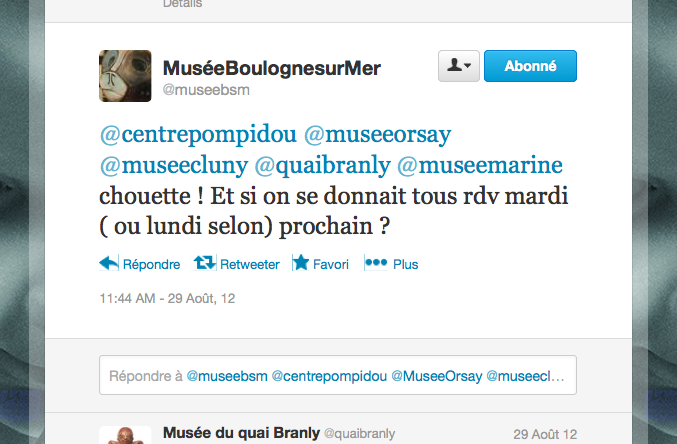Note: this is my first blogpost in English, I hope readers who do not read French will enjoy it, and I’ll do my best to translate some of my other major articles (such as Qui sont les #museogeeks ?), as well as publish original content in English. In the meantime, I suggest you may use Google Translate, which usually allows to get the main idea. Thanks!
In the beginning was the hashtag
Back at the end of summer 2012, some French museums were chatting on Twitter about what usually happens in their premises when they are closed to the public. What was a mere answer to a visitor’s question about opening days became an online interpretation tool.
Here is a short explanation about the #jourdefermeture initiative and how some museums use this hashtag. Translation note: I find it quite difficult to translate jour de fermeture, which literally means ‘closing day’ or ‘day(s) the museums are closed to visitors’. Some museums tweeting in English use #closingday, but I understand it doesn’t cover the full meaning of the concept.
Basically, #jourdefermeture is a hashtag that French-speaking museums use on Mondays and Tuesdays – depending on their closing day – to invite visitors backstage. Cultural institutions mainly share photographies of the mounting and dismounting of exhibitions as well as traveling exhibitions, permanent collections re-arranging, and any kind of info related to what is going on at the museum while it’s closed to visitors.
How is #jourdefermeture used by museums?
The hashtag serves for interpretation and educational purposes, even with only 140 characters. It also serves one of the main missions given to museums: providing visitors with information about how the institution works, about the collections and the conservation of the works of art, and about other fields of interests such as PR, funding or security at the museum. While satisfying the curiosity of visitors, #jourdefermeture also helps to answer questions asked by frustrated visitors who cannot access the premises¹, and helps reducing the gap between museums and theirs users.
From a PR point of view, this simple hashtag has a potentially powerful reach when museums join forces in a common movement. But there are also drawbacks: as often, big popular museums tend to be over-exposed. Pictures posted by the Louvre, the Palace of Versailles or the Pompidou Center get more visibility than “smaller” museums, thanks to their numerous followers. Nevertheless, other non-museum institutions tend to adopt #jourdefermeture like @forumdesimages, for instance, which is an cinema and TV-oriented art center in Paris.
As for technical aspects, this initiative is a light project for teams dealing with social media: a smartphone with a photography functionality is sufficient (but many museums prefer browsing their professional photographies when they have such a database). And it is flexible: no compulsory participation, and museums are free to participate when they have relevant content to publish on Mondays or Tuesdays.
Thanks to social media (and community managers friendship on an international level), #jourdefermeture is now used by french museums, from the smaller ones to the internationally renowned, both in Paris and elsewhere in France, as well as a growing number of Swiss museums (e.g., @MAHGeneve) and French Canadian museums (among them are @pointeacalliere, @mnbaq and @mcqorg) – no Belgian museums has joined the movement for now. Thus, #jourdefermeture opens the way to new collaborations between cultural institutions, sharing their most precious asset: their collections.
Elsewhere, in the UK and the US, it seems like such an initiative wouldn’t be as popular, since many museums are open 7 days a week in London, among others, and several New York based museums recently decided to do the same. If you live in a city and/or country where museums never close, I’d be glad to read your thoughts on the question, feel free to comment!
Further reading (in French)
- #jourdefermeture’s website: www.jourdefermeture.fr.
- #jourdefermeture’s definition on #tagdef
- RTS, Radio Télévision Suisse romande did a sound on #jourdefermeture.
- two other blogposts on the subject: Judith Gagnon and Le Point C.


